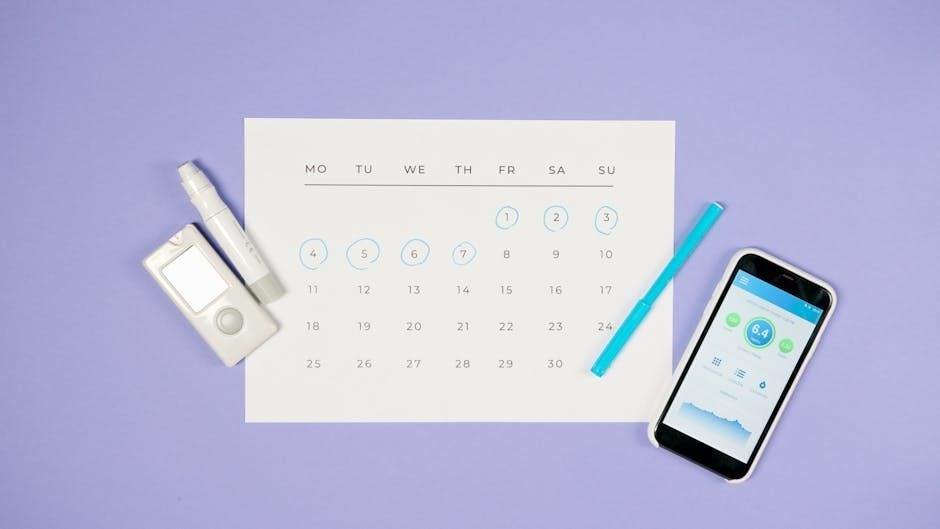
A Diabetes Care Plan is a structured approach to managing diabetes, empowering individuals to take control of their condition through personalized strategies and continuous support.
1.1 What is a Diabetes Care Plan?
A Diabetes Care Plan is a personalized document outlining strategies for managing diabetes, developed with healthcare professionals. It includes medication schedules, dietary advice, exercise plans, and monitoring guidelines to maintain blood glucose levels, prevent complications, and enhance well-being.
1.2 Importance of a Diabetes Care Plan
A Diabetes Care Plan is crucial for effective diabetes management, preventing complications, and improving quality of life. It provides a personalized approach, ensuring consistent care and guiding patients and healthcare providers in making informed decisions.

Understanding Risk Factors for Diabetes
Identifying risk factors like age, gender, ethnicity, and family history helps in early detection and management of diabetes, enabling proactive measures to reduce disease progression.
2.1 Age, Gender, and Ethnicity
Age increases diabetes risk, with most cases diagnosed after 45. Men are slightly more prone to Type 2 diabetes than women. Ethnicity also plays a role, with higher prevalence in African, Caribbean, and Asian populations. These factors guide tailored prevention and management strategies.
2.2 Family History and Genetic Predisposition
A family history of diabetes increases the likelihood of developing Type 2 diabetes. Genetic predisposition affects insulin sensitivity and secretion, making individuals more susceptible. Identifying these factors early helps tailor preventive measures and personalized care strategies.

Components of a Comprehensive Diabetes Care Plan
A comprehensive plan includes medical history, treatment goals, medication management, dietary advice, exercise routines, blood glucose monitoring, and support systems to ensure effective diabetes management and improved quality of life.
3.1 Medical History and Current Health Status
Assessing medical history and current health status is crucial for creating a personalized diabetes care plan. This includes evaluating coexisting conditions, allergies, medications, lifestyle factors, and dietary preferences to tailor interventions and ensure comprehensive management of diabetes effectively.
3.2 Treatment Goals and Targets
Establishing clear treatment goals and targets is essential for effective diabetes management. These goals, set collaboratively with healthcare providers, focus on optimizing blood glucose levels, preventing complications, and improving overall health outcomes, ensuring a tailored approach to individual patient needs and circumstances.
3.3 Medication Management
Medication management is crucial for controlling blood glucose levels. It involves prescribing and monitoring diabetes medications, such as insulin or oral drugs, tailored to individual needs. Regular adjustments ensure effectiveness and safety, while patient education promotes adherence and understanding of medication roles in diabetes control.
3.4 Dietary and Lifestyle Recommendations
Dietary and lifestyle changes are fundamental to diabetes management. A balanced diet focusing on whole foods, portion control, and carbohydrate counting helps regulate blood sugar. Regular physical activity, stress reduction, and adequate sleep further support overall health and glucose stabilization, enhancing the effectiveness of the care plan.
3.5 Exercise and Physical Activity
Regular physical activity is crucial for managing diabetes, improving insulin sensitivity, and maintaining a healthy weight. Activities like brisk walking, cycling, or swimming can help lower blood glucose levels and reduce the risk of complications. Tailor your exercise routine to suit your lifestyle and preferences for consistency.
3.6 Blood Glucose Monitoring and Logging
Regular blood glucose monitoring and logging are essential for managing diabetes. Tracking glucose levels helps identify trends and patterns, enabling informed decisions about diet, exercise, and medication. Consistent logging provides healthcare providers with valuable data to adjust treatments and prevent complications like hypoglycemia and hyperglycemia.
3.7 Support Systems and Healthcare Team
A strong support system, including diabetes educators, dietitians, and healthcare providers, is crucial for effective diabetes management. Regular communication and collaboration with the healthcare team ensure personalized care, addressing specific needs and promoting better adherence to the care plan for improved outcomes.
Monitoring and Managing Blood Glucose Levels
Regular blood glucose monitoring is essential for managing diabetes, ensuring levels stay within target ranges, and promptly addressing hypo- or hyperglycemia to prevent complications and maintain overall health.
4.1 Frequency of Blood Glucose Testing
Frequency of blood glucose testing varies based on diabetes type and treatment. Typically, individuals with Type 1 diabetes test 4-6 times/day, while those with Type 2 may test 1-2 times/day. Testing before meals, bedtime, and as needed for symptoms is common, with adjustments guided by healthcare providers.
4.2 Target Blood Glucose Levels
Target blood glucose levels typically range from 70-130 mg/dL before meals and less than 180 mg/dL after meals. These targets help maintain optimal glucose control, reducing the risk of diabetes-related complications and promoting overall health and well-being for individuals with diabetes.
4.3 Managing Hypoglycemia and Hyperglycemia
Managing hypoglycemia involves consuming fast-acting carbs, while hyperglycemia requires adjusting medication, diet, or exercise. Regular blood glucose monitoring and individualized plans help prevent and manage these conditions, ensuring stability and reducing the risk of diabetes-related complications.

Preventing Diabetes-Related Complications
Preventing diabetes-related complications involves early detection, regular exams, and managing risk factors. Focus on eye, foot, nerve, and kidney health to avoid long-term damage and improve quality of life.
5.1 Eye Care and Regular Exams
Diabetic eye care requires annual comprehensive eye exams to detect conditions like diabetic retinopathy. Early detection through dilated eye exams and retinal screenings can prevent vision loss. Regular monitoring and timely interventions are crucial for preserving eye health and reducing complications. Consistent care ensures optimal vision outcomes for individuals with diabetes.
5.2 Foot Care and Prevention of Ulcers
Regular foot inspections and professional check-ups are vital to detect early signs of ulcers or infections. Wearing proper footwear and keeping feet clean and dry prevent injuries and infections. Managing blood glucose levels further reduces the risk of complications in diabetic patients effectively.
5.3 Nerve and Kidney Health
Diabetic neuropathy and nephropathy require proactive management. Regular monitoring of kidney function, controlling blood pressure, and maintaining stable glucose levels can prevent nerve damage and kidney disease. Early detection through annual screenings ensures timely intervention, preserving nerve function and kidney health for long-term well-being.

Lifestyle Modifications for Diabetes Management
Lifestyle changes are crucial for managing diabetes, focusing on healthy eating, regular exercise, and stress reduction to improve overall well-being and glucose control effectively.
6.1 Healthy Dietary Choices
A balanced diet is essential for diabetes management, focusing on complex carbs, lean proteins, and healthy fats. Meal planning and portion control help maintain blood sugar levels, promoting overall health and preventing complications.
6.2 Regular Physical Activity
Regular exercise helps manage blood glucose levels, enhances insulin sensitivity, and improves overall health. Aerobic and strength-training activities are recommended, tailored to individual fitness levels. Always consult a healthcare provider to develop a safe and effective exercise plan.
6.3 Stress Management and Mental Health
Stress management is crucial for diabetes care, as stress can affect blood glucose levels; Techniques like mindfulness, yoga, and counseling can help. Addressing mental health issues, such as anxiety or depression, is vital to overall well-being and effective diabetes management. Healthcare providers can offer tailored resources and support.

Creating a Personalized Diabetes Care Plan
A personalized diabetes care plan involves tailored strategies for managing diabetes, developed with healthcare professionals, focusing on individual needs, preferences, and health goals, ensuring regular reviews and adjustments.
7.1 Collaborating with Your Healthcare Team
Effective collaboration with your healthcare team ensures a well-rounded approach to diabetes management, combining expertise from doctors, nurses, dietitians, and educators to create a cohesive plan tailored to your specific needs and health status, promoting better outcomes and adherence to treatment goals.
7.2 Setting Realistic Goals and Targets
Setting realistic goals involves creating achievable targets aligned with your health needs and lifestyle. Focus on specific, measurable objectives, such as blood glucose levels, dietary changes, and physical activity, to ensure steady progress and maintain motivation in managing diabetes effectively.
7.3 Regular Review and Adjustment of the Plan
Regularly reviewing and adjusting your Diabetes Care Plan ensures it remains effective and relevant. Schedule periodic check-ins with your healthcare team to monitor progress, assess changing needs, and make necessary modifications to maintain optimal diabetes management and achieve long-term health goals.

Education and Support for Diabetes Management
Educating patients on diabetes self-management is crucial for effective care. Tailored education, support groups, and access to resources empower individuals to manage their condition confidently and sustainably.
8.1 Diabetes Self-Management Education (DSMES)
DSMES is essential for teaching patients about their condition, treatment options, and self-care. It focuses on personalized education, addressing four critical times: diagnosis, annual evaluations, when targets aren’t met, and during life transitions, ensuring improved adherence and better health outcomes.
8.2 Support Groups and Community Resources
Support groups and community resources provide emotional support, practical advice, and connections with others facing similar challenges. These networks help individuals cope with diabetes, offering resources for education, lifestyle adjustments, and disease management, enhancing overall well-being and adherence to care plans.
8.3 Access to Educational Materials and Tools
Access to educational materials and tools is essential for effective diabetes management. These resources, such as guides, workbooks, and online tools, provide patients with the knowledge and skills needed to understand and manage their condition, promoting informed decision-making and improved health outcomes.

Emergency Care and Hypoglycemia Management
Emergency care for hypoglycemia involves prompt recognition of symptoms like dizziness or confusion, immediate intake of fast-acting glucose, and seeking medical help if severe. A diabetes care plan ensures preparedness and prevention of such episodes through education and timely interventions.
9.1 Recognizing Symptoms of Hypoglycemia
Symptoms of hypoglycemia include shakiness, sweating, dizziness, confusion, hunger, irritability, and fast heartbeat. Severe cases may lead to loss of consciousness. Early recognition is crucial for prompt intervention and preventing complications. Immediate action is necessary to restore blood glucose levels and ensure patient safety.
9.2 Immediate Actions for Hypoglycemia
If hypoglycemia occurs, immediately consume fast-acting carbohydrates like glucose tablets, juice, or candy; If unconscious, administer glucagon as directed. Seek emergency care if symptoms persist or worsen. Prompt action is vital to restore blood glucose levels and prevent complications.
9.3 When to Seek Emergency Care
Seek immediate medical attention if hypoglycemia symptoms persist despite treatment, or if the person is unconscious, confused, or unable to eat. Call emergency services if glucagon is unavailable or symptoms worsen. Prompt action is crucial to prevent severe complications and ensure proper medical intervention.

References and Recommended Resources
American Diabetes Association guidelines and online tools provide comprehensive resources for creating effective diabetes care plans, ensuring evidence-based management and education for optimal patient outcomes.
10.1 American Diabetes Association Guidelines
The American Diabetes Association provides evidence-based guidelines for diabetes management, including care plans, to ensure optimal outcomes. These standards cover monitoring, medications, lifestyle changes, and complication prevention, offering a comprehensive framework for personalized diabetes care tailored to individual needs and healthcare provider practices.
10.2 Recommended Reading and Online Tools
Recommended reading includes the American Diabetes Association’s guidelines and resources from nurseslabs.com. Online tools offer comprehensive guides, templates, and educational materials to support diabetes management. These resources provide evidence-based information and practical strategies for creating effective care plans tailored to individual needs.